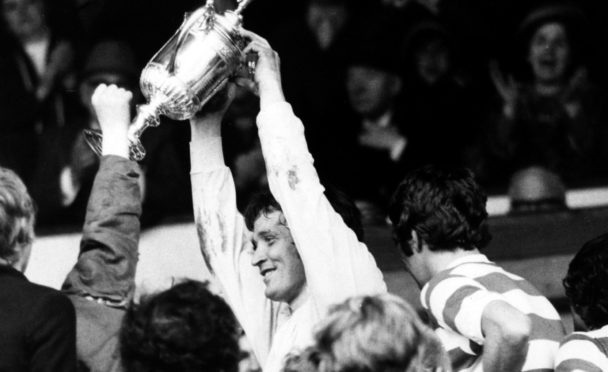
It takes two teams to make a magnificent cup final.
Celtic’s 6-1 thrashing of Hibs in 1972 looks like a one-sided walkover for Jock Stein’s men.
But former Hoops goalkeeper Evan Williams knows that wasn’t the case.
Dixie Deans may have grabbed the headlines with a hat-trick, but Williams had to produce a trio of saves to make sure there wasn’t a nervous ending to the match.
Eddie Turnbull sent the Hibees out to attack in the second half when they were only 2-1 down, which made for magnificent viewing for the spectators.
“Hibs were a good side,” said Williams. “We just seemed to take every chance we created.
“When it got to 4-1 and then 5-1, we were playing great football but I knew we couldn’t ease off.
“They had players with pace like Arthur Duncan and Alex Edwards, who I really rated. Even at 6-1, I was still on edge.
“I wasn’t nervous before those games. Going out to play in front of more than 100,000 fans was a great feeling.
“I loved Old Firm games. I’d won my first Scottish Cup medal against Rangers the previous season.”
Bobby Murdoch ruled the midfield in the 1972 Final, while Deans ran riot just three weeks after he’d sent a penalty high over the bar as Celtic lost the European Cup semi-final to Inter Milan in a shoot-out.
Deans didn’t always look the most athletic of strikers, but bouncing back from that to star at Hampden showed he lacked nothing in character.
His second goal, where he weaved round Hibs’ goalie Jim Herriot twice before smacking it home, was very special.
“Dixie’s timing in the air was unbelievable, and he was quite a character,” said Evan.
“He was deceptively quick, especially over the short distance that’s so important for goalscorers.
“In a race over 20 yards, he was second only to Bobby Lennox, which shows how sharp he was.”
The 6-1 win was especially sweet for Evan and his Celtic team-mates as it helped a little to ease painful memories of their shock 4-1 defeat by Partick Thistle in the League Cup Final earlier that season.
Evan went on: “I’m not doing down Thistle’s win. They deserved to win the trophy. But three of their goals were deflected past me by Jim Brogan.
“For years we’d kid him that he scored a hat-trick at Hampden.”
Goalkeepers now get a lot more protection from refs than they did in Evan’s day, and while he’d have welcomed a little of that, he’s puzzled by the lengths keepers go to in guarding their hands.
He said: “I look at modern-day goalies and they look like they’re wearing welders’ gloves.
“I very rarely wore gloves. The only thing I had was the thin, cotton gloves for times when it was very wet.
“Everyone pushes the ball away now, but I liked to come and catch it. I’d reckon I came for 70 to 80% of cross balls and held them.
“I remember big Billy McNeill saying that he got a rest from heading the ball when I arrived from Wolves.”
Last Wednesday, it was exactly 48 years since that 6-1 win, but also the 50th anniversary of Evan’s outstanding performance in the 1970 European Cup Final.
Celtic lost 2-1 to Feyenoord in Milan, but it was thanks to their keeper that it went to extra-time.
“I was supposed to go over to Rotterdam last week to commemorate the game,” he said.
“It’s quite unusual for the winning team to acknowledge that someone in the opposition was Man of the Match.
“It was the best – and worst – day of my career.”
1970: Aberdeen 3 Celtic 1
Controversy, conflict, curiosity and a victory for the underdogs. This was a Final that had it all.
Aberdeen lifted the trophy with a performance that inspired tumultuous applause from the 108,343 spectators crammed into Hampden Park.
Even Celtic fans, who left with a sense of injustice, saluted the Dons.
Eddie Turnbull’s team, led by 21-year-old captain Martin Buchan, had been written off as 5-1 outsiders.
The players, however, were feeling confident after beating Celtic away in the league three weeks earlier.
The Dons went ahead when Joe Harper coolly converted a penalty after 27 minutes.
Bobby Lennox then had the ball in the net, only for referee Bobby Davidson to chalk it off, and he also waved away appeals by the same player for a penalty kick.
There were three goals in the last seven minutes – two of them from the Dons’ Derek “Cup-tie” McKay.
The Dundee cast-off scored just four times during his Pittodrie career, and every goal came in this Cup run.
Lennox had an effort that stood in between McKay’s double, but it was merely a consolation.
The Cup was heading north and Eddie Turnbull was able to spend Sunday parading the trophy through the Granite City on his 48th birthday.
1973: Rangers 3 Celtic 2
The SFA’s Centenary Scottish Cup Final was decided by a goal scored from all of six inches.
Tom Forsyth was better known for hitting opponents rather than the net, and his tough-tackling style earned him the nickname “Jaws”.
His famous winner came just a few months after signing from Motherwell, and was his first goal in light blue.
Derek Johnstone’s header from a Tommy McLean free-kick hit both posts, and Forsyth was on hand to stab home a ball that was trickling along the line.
The merest touch of his studs had won the Cup and, arms aloft, Forsyth set off on a joyful run.
He later reflected: “Scoring in my first Cup Final was a dream.
“To get the winner in such a great Final was unbelievable, and I think my celebration said it all.”
Kenny Dalglish had put Celtic ahead before a Derek Parlane header saw the sides go in level at half-time.
Alfie Conn put Rangers ahead just 20 seconds after the restart, but a George Connelly penalty made it 2-2.
Then Forsyth struck from close- range on the hour mark and Rangers lifted the trophy for the first time since 1966.
A Cup triumph that has John Greig in tears at full-time has to be something special.
1987: St Mirren 1 Dundee United 0
St Mirren’s first Scottish Cup triumph since 1959 was the type of game that is unlikely to be repeated.
It was the last Final where all the players, and both managers, had been born in Scotland.
That, and the winning goal, is more memorable than most of the action.
It was a rather disjointed, mediocre occasion that was settled in extra-time by 20-year-old Ian Ferguson.
Iain Ferguson of Dundee United thought he’d put the Tangerines ahead during the additional 30 minutes, but referee Kenny Hope decided Kevin Gallacher was offside.
There were 110 minutes on the clock when the other Ferguson burst through, and sent a left-foot shot high into the net past former Saint, Billy Thomson.
The victory was an example of success being brought to a club in a short time.
Buddies boss Alex Smith had started the season in charge of Stirling Albion, while Ferguson had been plying his trade with Clyde.
Dundee United had to quickly lick their wounds, and prepare for the second leg of the UEFA Cup Final against IFK Gothenburg, having lost 1-0 in Sweden.
But a 1-1 draw at Tannadice wasn’t enough to prevent them losing two trophies in five days.
1994: Dundee United 1 Rangers 0
It is impossible to overstate what a big deal this was for Dundee United.
The Tayside club had never won the trophy before and, agonisingly, had finished runners-up five times – 1981, 1985, 1987, 1888, and 1991– in the previous 13 years.
Jim McLean had also been manager when the Tangerines lost the 1974 Final to Celtic, but by this time had moved upstairs to become club chairman.
This longed-for success, achieved under the eccentric Ivan Golac’s stewardship, was all the sweeter, too, for being unexpected.
They required replays against Motherwell, Airdrie and Aberdeen to reach the Final.
Walter Smith’s Rangers, on the other hand, were going for the Double Treble, and went into the tie as overwhelming favourites.
But thanks to dogged performances from the likes of David Hannah, Gordan Petric and matchwinner, Craig Brewster, the silverware entered the Tannadice trophy cabinet for the first time.
Gers keeper Ally Maxwell received some criticism at the winning goal, three years after he’d been Motherwell’s Final hero against United.
The Final Hurdle, the popular United fanzine, paid the most-fitting tribute, instantly switching their name to The Final Hurdled.
2012: Hearts 5 Hibernian 1
Any Hearts or Hibs fan patiently waiting to see another all-Edinburgh Final will not have been around when it finally occurred.
The clubs had not contested the trophy since 1896, when Hearts beat Hibs 3-1 in a match played at New Logie Green in the capital.
116 years on, some Edinburgh councillors pushed for this Final to be played at Murrayfield, but the SFA were having none of it.
So 51,041 headed west along the M8 to see a showdown even more one-sided than their previous meeting.
With Paulo Sergio’s side having beaten their Edinburgh rivals in all three league games in the 2011-12 campaign, a Hearts win was, in itself, not that remarkable.
The final scoreline and the comfort of the victory certainly were.
Danny Grainger, who scored his team’s third from the penalty spot, said recently his team could have scored six, seven or eight.
In fairness to Hibs, they had to play for much of the game with 10 men after Pa Kujabi was dismissed conceding the spot-kick from which Grainger netted to make it 3-1.
Darren Barr and Rudi Skacel had put the Jambos two up before James McPake pulled one back.
Ryan McGowan and another from Man of the Match Skacel settled it.
2016: Hibernian 3 Rangers 2
A Final that will be remembered as much for the trouble on the pitch afterwards as the end of Hibs’ 114-year Scottish Cup hoodoo.
That is a shame because this was also a thrilling game of football, which see-sawed from first to last.
It was the only time the Final has been contested by two clubs outwith the top flight, and both got there by beating their Premiership local rivals along the way.
Mark Warburton’s Rangers had beaten Celtic in a semi-final penalty shoot-out, while the Hibees beat Hearts in a fifth-round replay.
Man of the Match Anthony Stokes scored first to put Hibs ahead after just three minutes, but when Kenny Miller levelled and Andy Halliday added a second, Rangers went into the final quarter-of-an-hour looking set to win their first major trophy since the financial meltdown of 2012.
However, when Stokes struck again in 80 minutes and David Gray added a third with a flying header in stoppage time, Hibs had a win worthy of their long wait.
That was the cue for thousands of the Hibs support to invade the field, fights broke out with Rangers fans and there were accusations of some Light Blues players being attacked.
The SFA launched an investigation, which cleared both clubs of blame.

Enjoy the convenience of having The Sunday Post delivered as a digital ePaper straight to your smartphone, tablet or computer.
Subscribe for only £5.49 a month and enjoy all the benefits of the printed paper as a digital replica.
Subscribe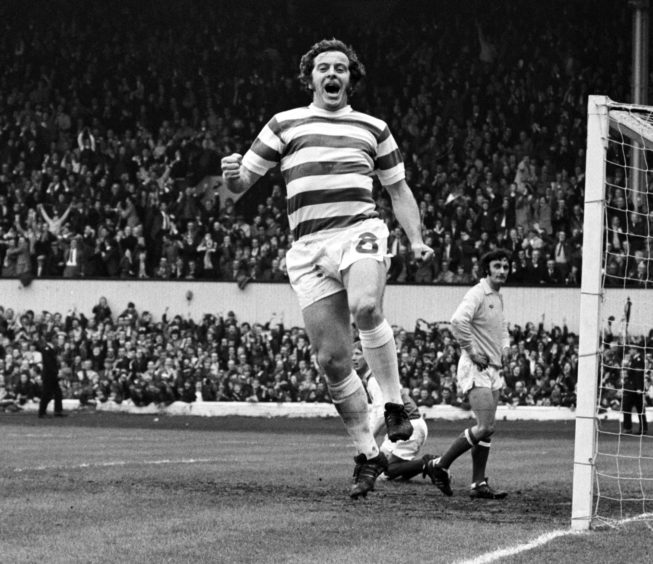 © SNS
© SNS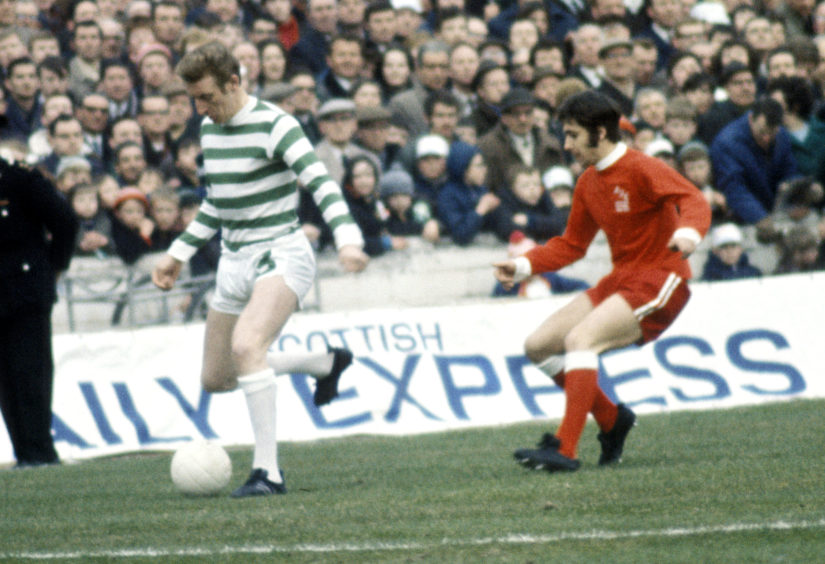 © SNS
© SNS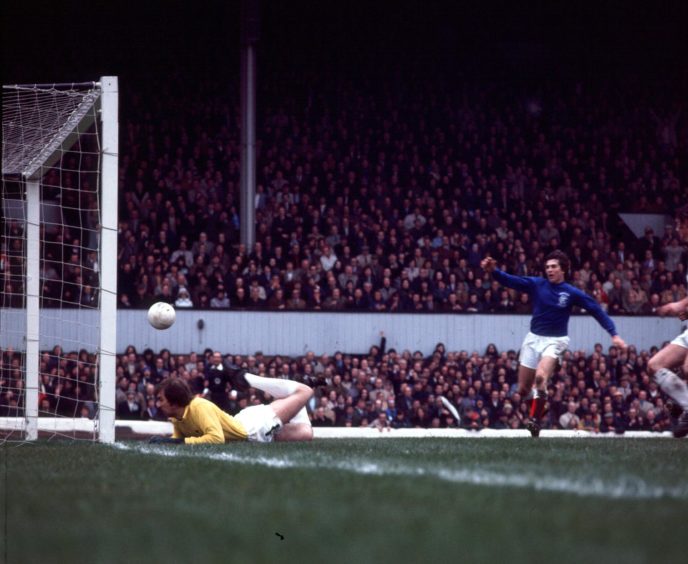 © SNS
© SNS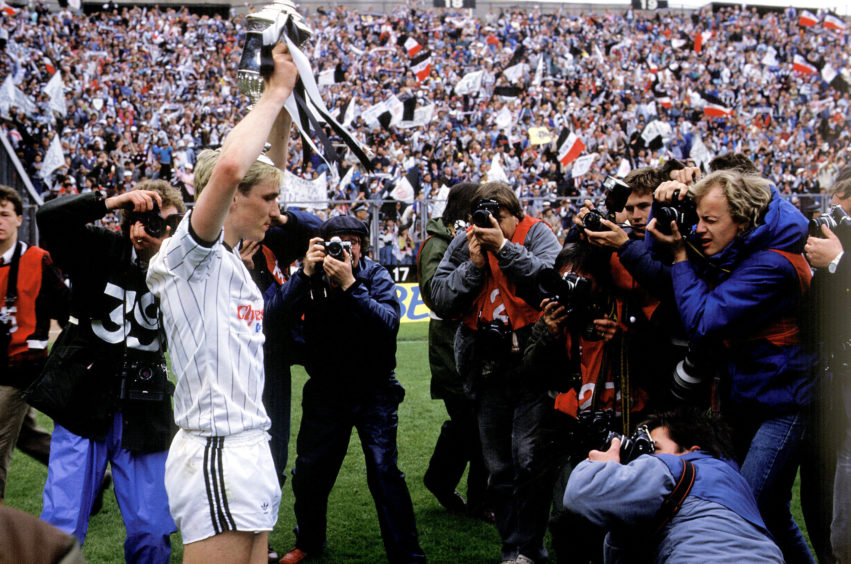 © SNS
© SNS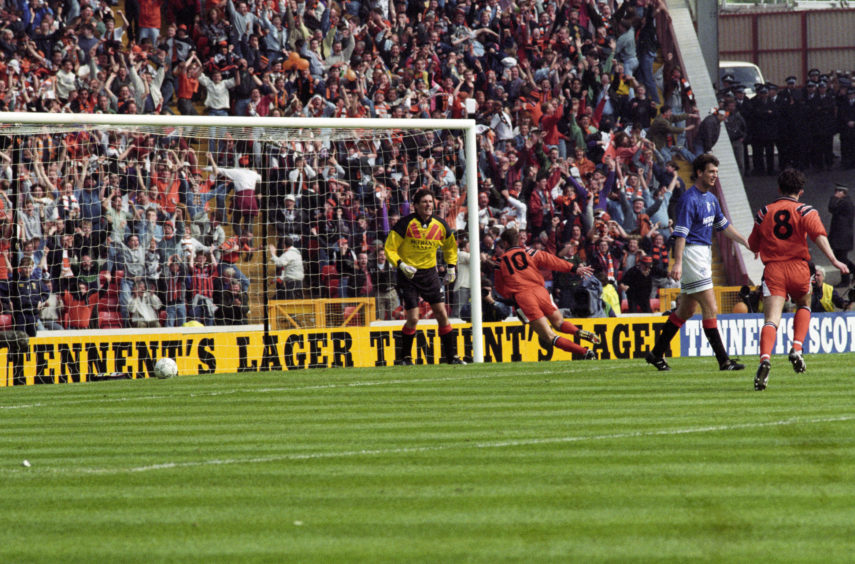 © SNS
© SNS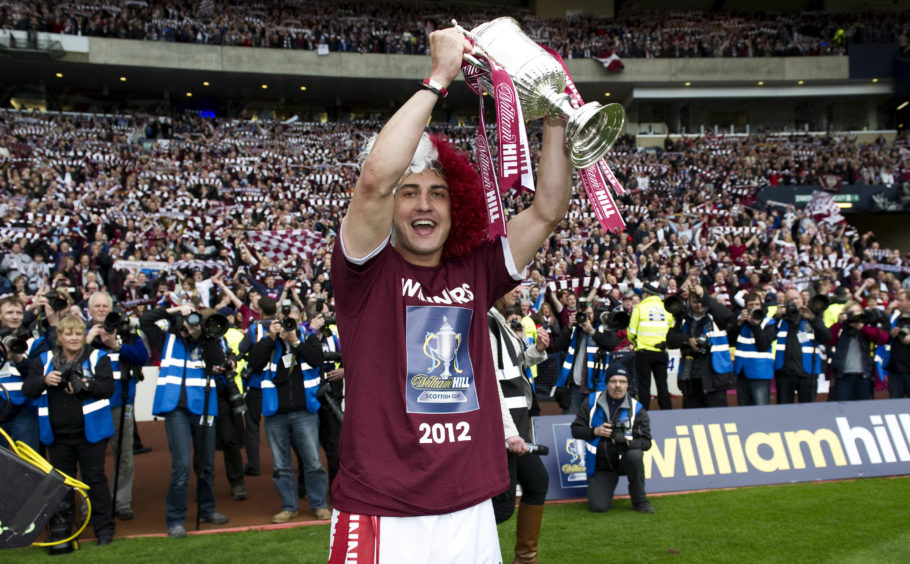 © SNS
© SNS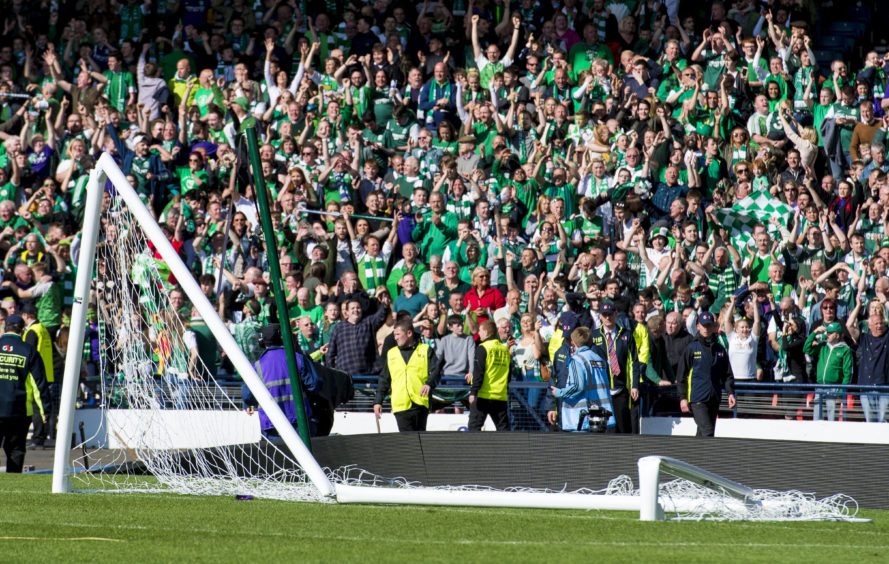 © SNS
© SNS